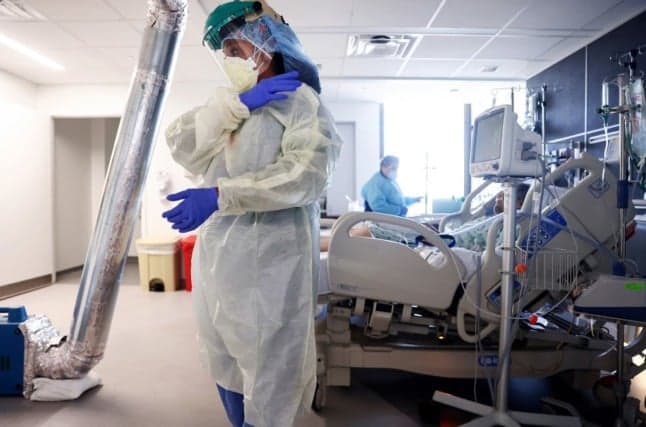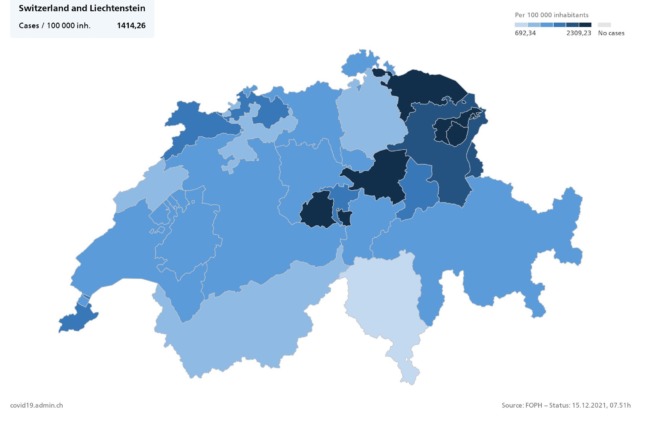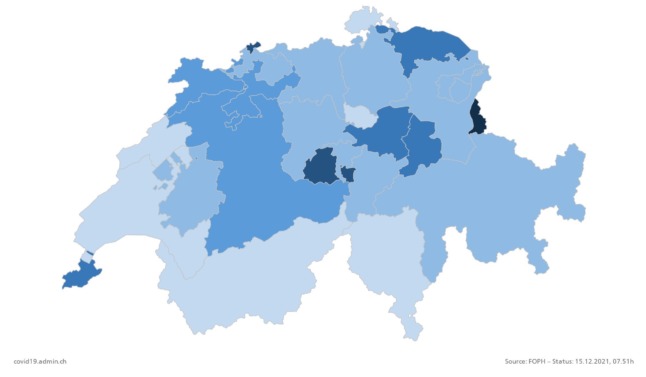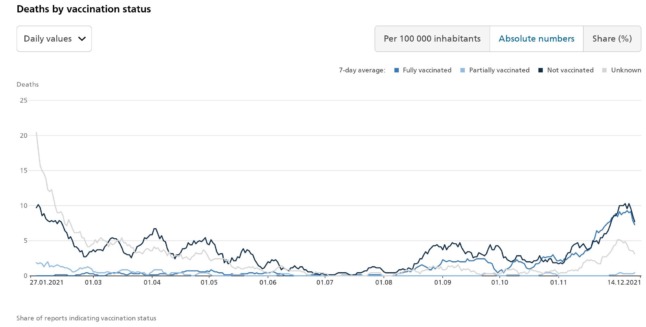‘Highest incidence ever’: Where are Switzerland’s Covid hotspots?

Switzerland is recording a high number of coronavirus infections and more ICU patients. This is what the numbers look like this week.
The epidemiological situation in Switzerland has been getting worse each week.
In fact, Switzerland is currently the fifth country in the world in terms of the highest seven-day incidence of new coronavirus cases, based on official numbers.
It is doing worse than its neighbours Germany, Austria, Italy, and France and is currently fifth of all countries worldwide.
“While Austria emerges from a three-week general lockdown and in Germany unvaccinated people are practically excluded from social life, there are measures in Switzerland that can be considered particularly flexible”, Blick said to explain the deteriorating situation.
Data from the Federal Office of Public Health (FOPH) confirms this trend.
While the daily number of infections has not risen dramatically since last week — between 8,000 and 11,167 new cases have been recorded — Switzerland now has “the highest incidence since the start of the pandemic", according Health Minister Alain Berset.
Also, the pockets of infection have spread throughout most of the country from their former epicentres in eastern and central Switzerland.
As this FOPH map shows, only a handful of cantons — Ticino, Zurich, Solothurn, Neuchâtel and Valais — have an infection rate slightly lower than the national average of 1,414,26 cases per 100,000 population.

Hospitals
Authorities have been issuing warnings about Switzerland’s ICUs getting crowded as more coronavirus patients are admitted.
From 217 Covid patients treated in intensive care units on November 30th and 264 on December 7th, the number is now 289 — only 11 patients short of the 300-mark when hospitals will have to start making triage decisions.
READ MORE: Should vaccinated people have triage priority in Swiss hospitals?
Most Covid patients are in ICUs in Basel-City, Obwalden and Geneva, followed by Schwyz, Glarus, Bern, Jura, and Solothurn.

There has also been an increase in vaccinated patients in some hospitals.
At Geneva University Hospitals (HUG), Switzerland’s largest medical facility, 45 percent of Covid patients are vaccinated.
Beds are currently occupied by coronavirus patients ranging in age from 31 to 72 years old, according to Jérôme Pugin, head of the HUG’s intensive care unit.
There are two kinds of vaccinated people who have ended up at the ICU, Pugin said.
“One group is relatively young and unvaccinated and the other is relatively old, vaccinated but immunosuppressed, that is, more risk of catching infectious diseases”, Pugin said in an interview with Tribune de Genève.
Among the older group, “we are dealing with people who were vaccinated at the beginning of the year, so the vaccine efficacy has decreased”, he said.
Deaths
The number of Covid-related deaths has remained relatively stable, which, health officials say, is thanks to vaccination.

What’s ahead?
On Friday, the Federal Council will announce whether it will implement new, tighter measures to rein in the spread of coronavirus.
The two options that were discussed by the canton this week are the ‘2G’ rule — allowing access to indoor places only to those who have been vaccinated or recovered from Covid — or partial closures.
READ MORE: 2G or closures: Switzerland presents new Covid measures plan
Comments (1)
See Also
The epidemiological situation in Switzerland has been getting worse each week.
In fact, Switzerland is currently the fifth country in the world in terms of the highest seven-day incidence of new coronavirus cases, based on official numbers.
It is doing worse than its neighbours Germany, Austria, Italy, and France and is currently fifth of all countries worldwide.
“While Austria emerges from a three-week general lockdown and in Germany unvaccinated people are practically excluded from social life, there are measures in Switzerland that can be considered particularly flexible”, Blick said to explain the deteriorating situation.
Data from the Federal Office of Public Health (FOPH) confirms this trend.
While the daily number of infections has not risen dramatically since last week — between 8,000 and 11,167 new cases have been recorded — Switzerland now has “the highest incidence since the start of the pandemic", according Health Minister Alain Berset.
Also, the pockets of infection have spread throughout most of the country from their former epicentres in eastern and central Switzerland.
As this FOPH map shows, only a handful of cantons — Ticino, Zurich, Solothurn, Neuchâtel and Valais — have an infection rate slightly lower than the national average of 1,414,26 cases per 100,000 population.

Hospitals
Authorities have been issuing warnings about Switzerland’s ICUs getting crowded as more coronavirus patients are admitted.
From 217 Covid patients treated in intensive care units on November 30th and 264 on December 7th, the number is now 289 — only 11 patients short of the 300-mark when hospitals will have to start making triage decisions.
READ MORE: Should vaccinated people have triage priority in Swiss hospitals?
Most Covid patients are in ICUs in Basel-City, Obwalden and Geneva, followed by Schwyz, Glarus, Bern, Jura, and Solothurn.

There has also been an increase in vaccinated patients in some hospitals.
At Geneva University Hospitals (HUG), Switzerland’s largest medical facility, 45 percent of Covid patients are vaccinated.
Beds are currently occupied by coronavirus patients ranging in age from 31 to 72 years old, according to Jérôme Pugin, head of the HUG’s intensive care unit.
There are two kinds of vaccinated people who have ended up at the ICU, Pugin said.
“One group is relatively young and unvaccinated and the other is relatively old, vaccinated but immunosuppressed, that is, more risk of catching infectious diseases”, Pugin said in an interview with Tribune de Genève.
Among the older group, “we are dealing with people who were vaccinated at the beginning of the year, so the vaccine efficacy has decreased”, he said.
Deaths
The number of Covid-related deaths has remained relatively stable, which, health officials say, is thanks to vaccination.

What’s ahead?
On Friday, the Federal Council will announce whether it will implement new, tighter measures to rein in the spread of coronavirus.
The two options that were discussed by the canton this week are the ‘2G’ rule — allowing access to indoor places only to those who have been vaccinated or recovered from Covid — or partial closures.
READ MORE: 2G or closures: Switzerland presents new Covid measures plan
Join the conversation in our comments section below. Share your own views and experience and if you have a question or suggestion for our journalists then email us at [email protected].
Please keep comments civil, constructive and on topic – and make sure to read our terms of use before getting involved.
Please log in here to leave a comment.